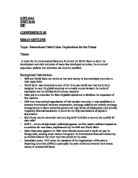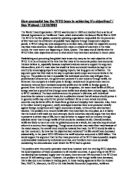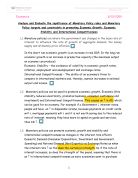International Debt Crisis - Implications for the Future
GWI OA1 UNIT 8-10 ISP CONFERENCE #3 ESSAY OUTLINE Topic- International Debt Crisis- Implications for the Future Thesis- In order for the International Monetary Fund and the World Bank to aid in the development and debt reduction of many less developed countries, the structural adjustment policies that determine aid must be modified. Background Information- - IMF and World Bank are institutes that lend money to less developed countries to help repay debts - World bank- was conceived as one of the three post-world war two institutions designed to steer the global economy on a steady course between the rocks of depression and the whirlpool of currency mayhem - Main job is to stimulate the flow of global capital and to facilitate the expansion of free markets - IMF is an international organization of 184 member countries. It was established to promote international monetary cooperation, exchange stability and orderly exchange arrangements; to foster economic growth and high levels of employment; and provide temporary financial assistance to countries the help ease balance of payment adjustments - Both funds require economic restructuring (SAP's) before a country can qualify for debt relief - SAP's - structural adjustment policies/programs- are free market policies imposed as a condition for new loans, implemented by the IMF and World Bank - Debt crisis came
How my Dad got his job in trade.
Ryan Harman 11th October 2001 THE JOB IN TRADE Hi! I'm Paul. This is the story about how my dad got his new job. It was 3.30am. I heard a noise and saw that the light was on, so I got out of bed and crept downstairs silently. The office door was ajar, and I could see my Dad still sat at the computer. He was so engrossed in his work, he did not see or hear me approach. I went to peer over his shoulder and the floorboard creaked as I got nearer to him. He was startled and was surprised to see me but he retaliated quickly and turned off the computer monitor. He had a sealed letter in his hand, which he asked if I would post for him in the morning on my way to school. I went back to bed and my bedside clock said 4.00am. Three hours later, it was time to get up for school as it was 7.00 am. I felt very tired because of my disturbed night. On my way to school, I nipped on down the post box to post the letter. I don't know what the letter contained - should I have a quick sneak I said to myself or would that be cruel. I slowly opened the letter. It said that my ambitious Dad was looking for a job, and it also enclosed a completed application form. The job was for a position at the World Trade Centre in New York. I sealed the envelope back down and posted it in the post box and went to school. A month passed. Our local postie was strolling up to the
Is Increased globalization a good thing?
Is Increased globalization a good thing? More and more people are becoming aware of the 'shrinking' world. The golden arch of McDonalds and the infamous Coca Cola logo are inescapable in almost every country. We only have to go as far as the nearest supermarket in order to see the extent to which citizens of one country are dependent on imported goods from other parts of the world. The World Wide Web is the most graphic example. In order to assess whether increased globalisation is a good thing or not, this essay will firstly discuss the term 'globalisation'. Then it will analyse the advantages and disadvantages of globalisation in our contemporary world. Over the course of the last few decades, the term 'globalization' has slowly crept into the words of politicians, economists, journalists, entertainers alike. It is a term especially controversial to define because it is a subject which undergoes constant dispute between academics about just what it means to speak of globalization. It is commonly associated with words such as capitalism, modernisation, liberalisation and is often used as a synonym for internationalisation and universalisation. Perhaps a good starting point for the discussion is one where globalization is defined as 'the process of increasing interconnectedness between societies such that events in one part of the world more and more have effects on
Interpol is an abbreviation for international police, which is the largest international police organisation.
Interpol is an abbreviation for international police, which is the largest international police organisation. Partly because of its size it has encountered many problems. The question is: What problems were Interpol faced in attempting to achieve its aims since its formation in 1923? As the name says it, its job is to act as police for the whole world sharing information and working with countries to facilitate cross border criminal police organisation. Its area lies under vast circumstances. Taking the area of control into consideration you could call Interpol 'The World Police.' A truly over lined name, still somewhat close to the real Interpol. Its main objective or mission is: 'To be the world's pre-eminent police organisation in support of all organisations, authorities and services whose mission is preventing, detecting, and suppressing crime.' This aim is achieved by facilitating international co-operation, co-ordinating operations with member countries, exchange information which is relevant and valuable and providing both regional focus and global perspective. Simultaneously remembering respect for human rights and such issues. Under such a broad perspective problems must have turned up. Some of the main and most important issues and problems will be analysed throughout. It was set up in 1923 under the rule of Dr. Johann Schober; the Interpol now consists of 181
International economic relations
International economic relations In modern form The theoretical basis of a study of international economic relations in its modern form was formed as a result of a long and difficult process, full of successes but, nevertheless, with important mistakes. The early roots are to be found, perhaps, in Antic Greece in the works of Aristotel, Platon and Xenophon. In general, the antic philosophers opposed to the big commerce, supporting the idea of a closed domestic economy. The closed character of the production of a self-supply type, dominating from the antiquity up to 15th century gave no incentives for developing any profound and constant studies on international trade. In these conditions is in no way occasional that the theorists of antiquity and Middle Ages (scholastics) exaggerated the role of production (especially agricultural) and pleaded against the "art of making money", the chrematistics (after Aristotel). At the dawn of the Modern Age (16th century) there appeared the first trials of more systematic analyses of the international economic relations. Developed during the period of the downfall of feudalism and the transition to capitalism, the mercantile theory was the first trial to explain integrally the principles of international trade in a paradigm of the analysis of economic reality. Perhaps, the field of international trade was first closely studied by men
Before I begin to discuss the question of the inevitability of the colonisation of Africa by the European powers I want to say that, colonisation as we know it; the taking over of a country
Inevitability of the African colonisation Before I begin to discuss the question of the inevitability of the colonisation of Africa by the European powers I want to say that, colonisation as we know it; the taking over of a country by another country and the forcing on of a different culture, is always evitable. At least it should be. However we have to include the fact that we're all human beings which think their own good superior to the one of others, and of course that we're all creatures which are enormously curious of the unknown. Whatsoever there are obviously more reasons which lead to nearly a whole continent being colonised, economic reasons, social Darwinism, national prestige, Missionary and humanitarian impulses, Military advantages, the will of exploration and scientific discoveries. Looking at all these reasons schematically I'll convince you of the evitability of the colonisation of Africa. To begin with, one of the reasons for colonisation was economical. The industrial revolution taking place in 1750-1800 provided the need for cheap raw material and there was a surplus capital in Europe so people were looking for new markets to sell their manufactured goods, without a new market the level of industrial production would go down causing problems like unemployment rates going up and social unrest at home. Also there was a specially high demand for
Generalized role of a purchase manager
Q1. GENERALIZED ROLE OF A PURCHASE MANAGER Job description for Purchasing Manager: A Purchase Manager manages all purchasing functions. Receives and grants approval for purchases of goods or services. Analyzes changes or new issues in materials and supply to reduce costs and improve quality. Requires a bachelor's degree with at least 8 years of experience in the field. Relies on experience and judgment to plan and accomplish goals. Manages a staff and typically reports to top management. PRIMARY DUTIES: * Acts as Request for Proposal Lead and Project Manager. * Plans, writes, and coordinates Requests for Proposals to meet current and proposed City projects. * Prepares and reviews construction bids and related documents. * Conducts and/or participates in Pre-bid, Pre-proposal and Pre-construction meetings, Proposal evaluation, and Bid/Request for Proposal openings. * Conducts the Request for Proposal Evaluation meetings to determine highest ranking firm(s) based on the compiling of score sheets of the Evaluation Committee. * Verifies bid calculations and bid bonds to prepare evaluation information, score sheets, and determines award of contracts. * Prepares staff reports for contracts and recommended awards for presentation to City Council for formal award determination and approval. * Prepares contracts, performance and payment bonds for approved
A massive population and rapidly developing economy make India the world's largest untapped market for American goods and services.
A massive population and rapidly developing economy make India the world's largest untapped market for American goods and services. If its ongoing transition from a socialist-style command economy to a free market comes to fruition, India will become even more attractive as a destination for investors. India's effort to liberalize its economy began in 1991 and was greatly accelerated after India joined the World Trade Organization four years later. However, with WTO multilateral negotiations currently ensnared by labor and environmental issues, India's reform efforts have proceeded at a slower pace than would be possible with a bilateral trade arrangement. The ruling BJP (Bharatiya Janata Party) has expressed its desire to encourage further economic developent in India by reducing trade barriers and encouraging foreign, particularly American, investment. The Clinton Administration failed to take advantae of this willingness by isisting on unrealistic labour and environmental standards and by relying solely on WTO mechanisms to reduce India's barriers to trade. The multilateral process, under which agreements are reached at the lowest common level, lags far behind what could be accomplished bilaterally. If the BJP is indeed willing to make unilateral tariff reductions, the Bush Administration should seize the opportunity to expand trade with India and reduce its tariffs by
The British State - Sociology-Power and Politics.
The British State Sociology-Power and Politics The state is defined as "a set of social institutions, concerned with passing laws, implementing and administering these laws and providing a legal machinery to enforce compliance with these laws." The state enjoys a monopoly of legitimate force in a given area and most of the time, laws are upheld. The UK State is made up of the diversity of social institutions. I.e. the PM, Cabernet, Civil Service, Judiciary, Parliament, etc. Britain does not have a written constitution unlike other countries. With no written constitution, changes are easier to make. Powers of the government are wide, since no written boundary to power exists. E.g. 1972 the government introduced a bill to increase army power in Northern Ireland. This bill was passed in the House of Lords and the House of Commons on that very same day. Powers of the State- The first power which the state has is its ability to make and enforce laws. Some laws are delegated to ministers who bring in law without parliament permission. Laws are enforced by the use of threat of punishment. The second power of the state, is its ability to raise large sums of finance. In 1985 taxes took 20% of all income received by all people in Britain. Governments differ on how the view taxing. Tories believe taxes should be lower to encourage free choice and enterprise. Where as Labour
Business Risk Analysis Global Business Plan for Global Builders - Manufactured Low Income Housing in Argentina
Business Risk Analysis Global Business Plan for Global Builders Manufactured Low Income Housing in Argentina December 6, 2004 I. Business Risk Analysis: Political/Legal/Regulatory Risks i. Today, Argentina is a solemn nation and political violence in this country is desolate. For over one hundred years, since about 1900, Argentina's magnified economic prosperity and nationalism is identified more along the lines of Europe and the United States of America rather than countries in Latin America. The commitment to international trade with such nations follows a hard to ignore economical and political collapse. Although strong industrial policies and global trade agreements pave the road to recovery for Argentina, investors fear there is some room for concern. ii. Concern over political risks sets back the progress of foreign investment. It decreases the creation of jobs and advancements in modern technology. There are, however several agencies that aid investors address problems with legal and regulatory risks. Organizations such as the Multilateral Investment Guarantee Agency (MIGA) and the Overseas Private Investment Corporation (OPIC) provide investment guarantees insuring investments against any political risk. These agencies were created to provide promotional and advisory services, which help create an attractive investment climate and promote direct






















